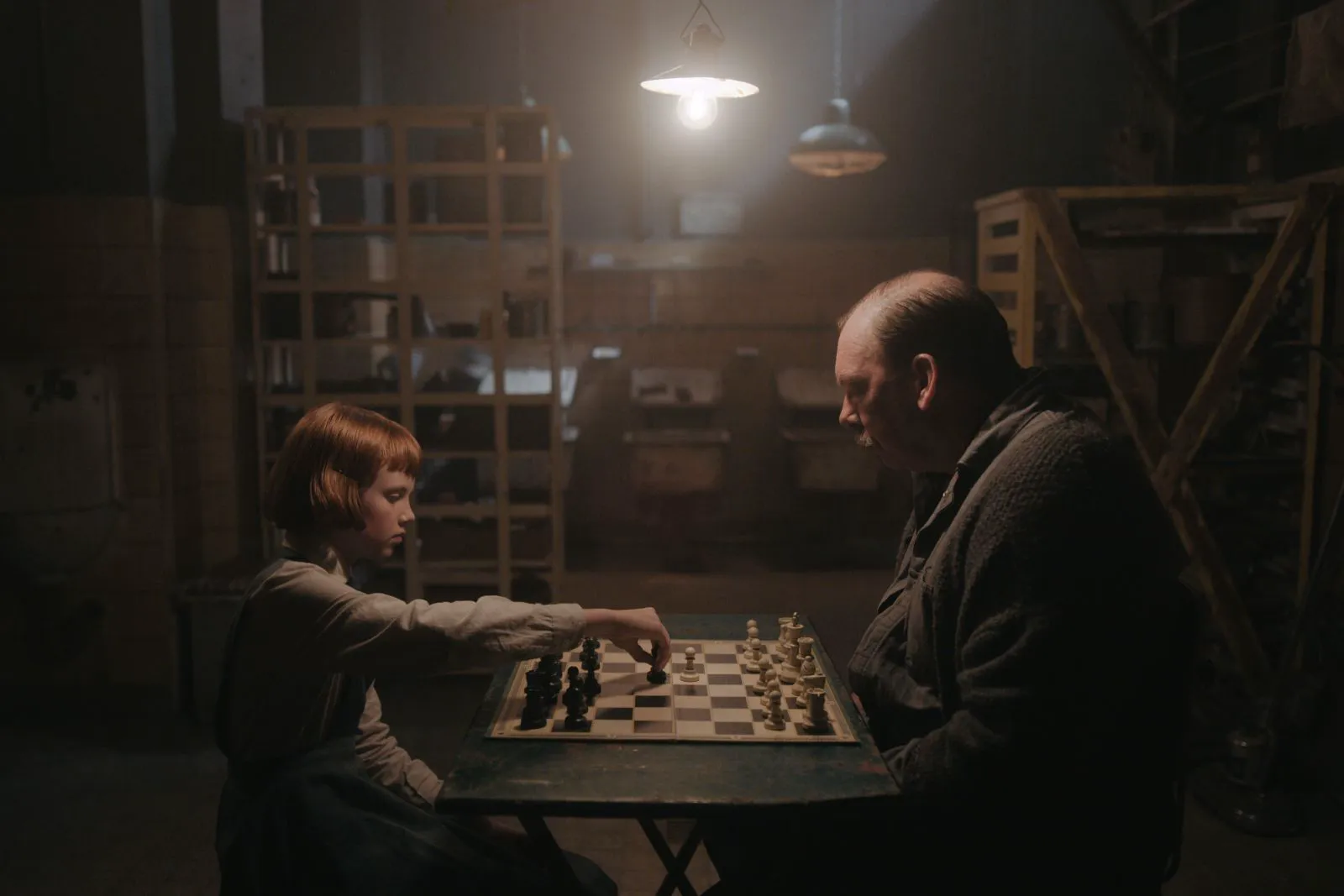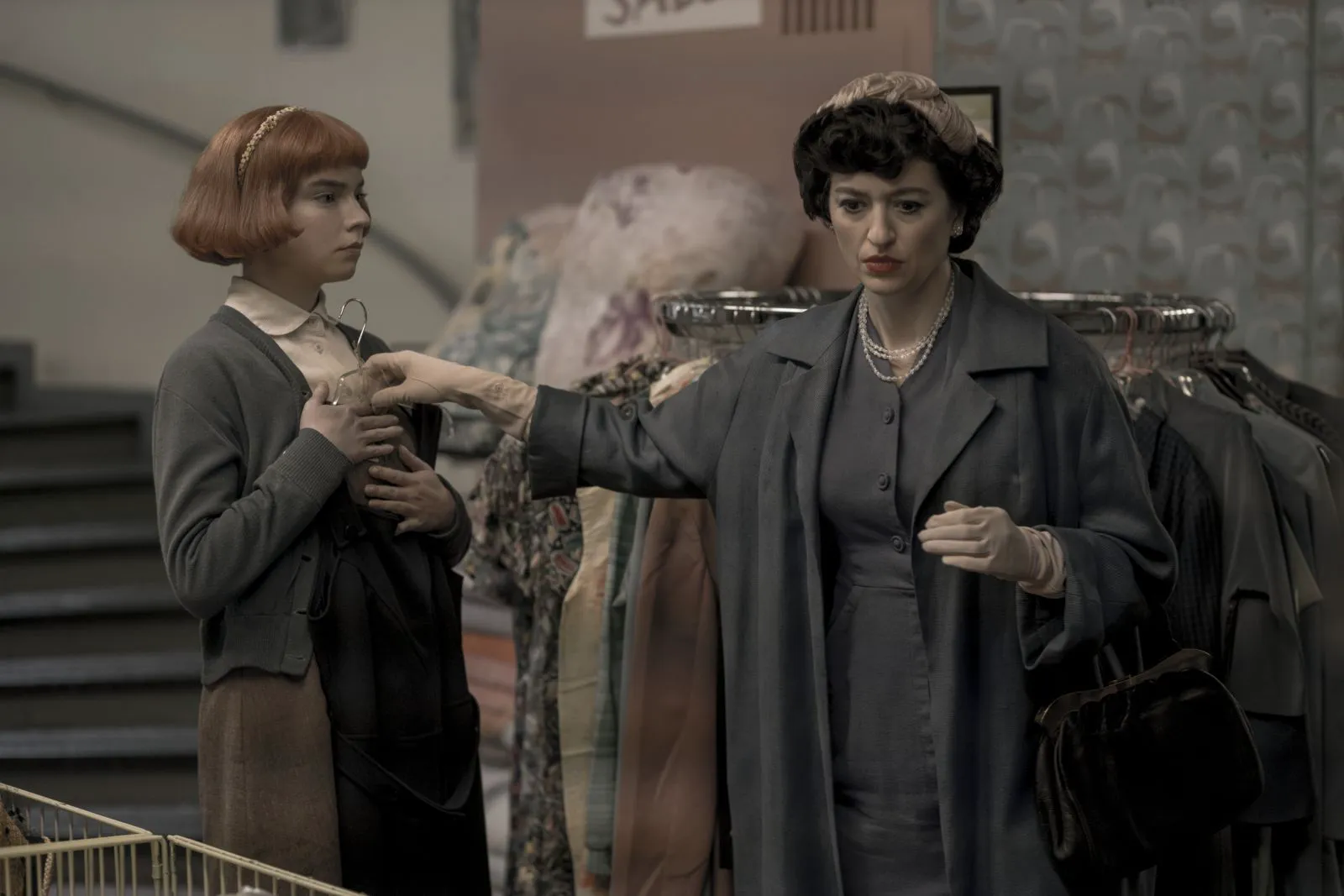Beth Harmon (played by the captivating Anya Taylor-Joy) tragically loses her mother early in life when, during yet another nervous breakdown, her mother crashes their car into an oncoming truck, narrowly avoiding taking her child to the grave with her. The young girl grows up in an orphanage where, through her interactions with a reclusive janitor (Bill Camp), she discovers a talent for chess. Years later, Beth is adopted by the compassionate Mrs. Wheatley (Marielle Heller, director of “A Beautiful Day in the Neighborhood,” who unexpectedly reveals a remarkable acting talent). Soon after, Beth becomes a promising grandmaster, achieving victory after victory on her path to the world championship. However, she faces two major obstacles. The first is the Soviet chess players, the best in the world, whom no American has been able to defeat in a long time. The second is Harmon’s alcohol and drug dependencies, which are difficult to overcome when her entire past is filled with trauma.

Anya Taylor-Joy as Beth Harmon in a still from “The Queen’s Gambit”
For the past couple of years, the media has been incessantly claiming that cinema is dying and that streaming services and TV will soon take its place. Mid-budget films are being replaced (or have already been replaced) by mini-series, which give creators more time for psychological exploration and exposition, and don’t require viewers to sit in front of the screen for two and a half hours. Usually, such talk makes you want to roll your eyes, but then something like “The Queen’s Gambit” comes along. Something that not only demonstrates exceptional skill in working with the long format but also tells a story that would never have worked as well in a feature film.

Bill Camp as the janitor in a still from “The Queen’s Gambit”
The Allure of “The Queen’s Gambit”
At first glance, it’s a standard sports drama, albeit about a not-so-standard sport (although “Pawn Sacrifice” has already proven that chess can be made exciting if desired, but, significantly, it flopped at the box office). It’s a straightforward success story, rhyming and running parallel with a coming-of-age narrative. There’s the obligatory first love, the looming figure of a strong, almost unattainable opponent, and the mentor (or mentors) who disappear at some point, following the manual from Campbell’s “The Hero with a Thousand Faces.” Put all of this into a feature film, and you’d get a catalog of dramatic clichés, recognizable plot hooks from the very beginning. But in “The Queen’s Gambit,” they exist completely organically, not perceived as banality or lazy writing. It turns out that the boundary between cliché and non-cliché lies not in the dramatic decision itself, but in its presentation, in the depth of the subtext.
Serialized Storytelling
Director Scott Frank works brilliantly with the serialized distance (not in the sense between the author and the story, but between the events within the plot). Lines introduced at the beginning of “The Queen’s Gambit” suddenly loudly remind us of themselves closer to the finale, and it hits so accurately and so painfully because the viewer – along with the heroine – perceives them as something that happened “a long time ago,” several years or many episodes ago. The viewer has time to forget about the characters that the main character has forgotten, and, probably, like her, feels guilty about it. In a sense, “The Queen’s Gambit” demonstrates why series are a more effective form for “slice of life” stories because, like life, series offer a fragmented experience. Cinema, on the other hand – unless you stretch out the viewing of a film over several evenings – is a complete and indivisible experience, and therefore it is much more difficult (although possible, of course) to show a story extended in time without cutting corners or resorting to obvious clichés.

Marielle Heller as Mrs. Wheatley in a still from “The Queen’s Gambit”
Beyond the Surface
But let’s move away from abstractions. “The Queen’s Gambit” is, of course, interesting not only from a cultural perspective – it is also a very captivating series beyond all the superstructures. The problem of genius and psychosis, or rather, how inseparable these two concepts are, finds an ideal space in Scott Frank’s work – the world of professional chess. A sport where people are forced to memorize a million combinations and run entire games through their heads with brains boiling from an overabundance of information. Interestingly, the author here doesn’t pretend to be a grandmaster and looks at Beth’s story more from the perspective of an ordinary person – he is interested not so much in the gambits, endgames, and Sicilian defenses themselves, but in the beautiful sound of chess terms that his characters throw around without any pity for the viewer. He revels in the thoughtful faces of the players and the eyes of Anya Taylor-Joy (and who wouldn’t, by the way), the aesthetics of a chess match, which in his hands turns into either an effective montage clip or a tense thriller.
A Master of Style
Frank also once again shows himself to be a skilled stylist. Director Panos Cosmatos of “Mandy” once said in an interview that the time period of a film or series is now not so much a dramatic decision as a stylistic one, much like choosing a lens for a camera and the color of the wall in the background. And so, in “The Queen’s Gambit,” the 60s seem to exist solely for the sake of costumes and decor elements, while the social or political features of the zeitgeist are of no interest to the series at all (and that’s good, it’s not about that). In Paris in '68, there are no student protests, and the confrontation with the Soviet chess player does not grow into a larger metaphor for the Cold War. On the contrary, people in the USSR sincerely rejoice in Harmon’s victories and are generally shown to be much more likable than the American establishment. For “The Queen’s Gambit,” the game is more important than politics. The personal is above the state. And the secret to friendship between peoples is very simple: you just need to sit down at the same chessboard. Shall we play?